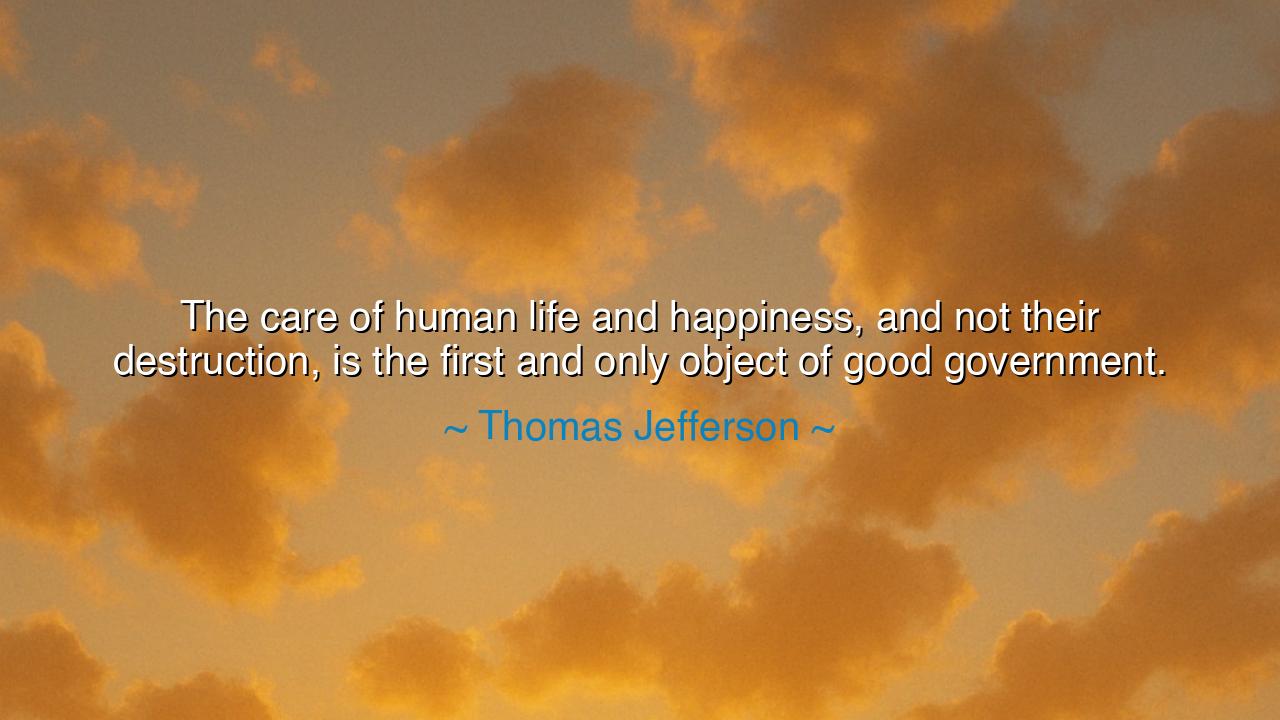
The care of human life and happiness, and not their destruction
The care of human life and happiness, and not their destruction, is the first and only object of good government.






Hear now the words of Thomas Jefferson, the sage of Monticello, whose heart beat in rhythm with the pulse of liberty itself. When he proclaimed, “The care of human life and happiness, and not their destruction, is the first and only object of good government,” he spoke as one who had witnessed both the promise and peril of power. These were not the idle musings of a philosopher gazing into the clouds—they were the solemn creed of a man who helped forge a nation from rebellion and reason. Jefferson’s voice rose in defense of humanity itself, declaring that the true measure of any government is not its might, nor its wealth, but its mercy.
In these words, Jefferson reminds us that the purpose of all authority, all law, and all governance is to serve life and happiness—not to crush them beneath the gears of ambition or greed. For what good is a government that conquers lands but loses souls? What glory lies in the power to destroy, if it cannot protect? The care of human life, he tells us, is sacred—a duty entrusted to rulers by the divine hand of nature itself. When a government forgets this sacred trust, it ceases to be good, no matter how lawful it appears or how loudly it proclaims its virtue.
To understand the weight of this truth, one must look to the age from which it arose. Jefferson had seen the tyranny of kings who believed their people were subjects to be used, not souls to be cherished. He saw the blood of the oppressed flow in the streets of Europe and heard the cries of men crushed beneath the boots of empires. Yet he also saw a vision—a republic where government existed not to command, but to protect; where power bowed before the rights of man. The founding of America was not merely a rebellion against Britain—it was a declaration that the preservation of life and liberty would henceforth be the first duty of government.
History offers many lessons in this truth, but none so stark as the fall of those nations that forgot it. Consider Revolutionary France, where the dream of liberty gave way to the terror of the guillotine. In their zeal to build a new world, men justified bloodshed in the name of freedom—yet by destroying life, they destroyed the very spirit they sought to defend. Jefferson, watching from across the sea, mourned this tragedy, knowing that no government of destruction could ever yield peace. From that chaos rose tyranny once more, for the sword that claims to free men often ends by enslaving them.
Thus, Jefferson’s words echo through the centuries like a warning bell. The happiness of the people—their dignity, their safety, their right to live in peace—must remain the compass of every law, the heart of every policy. When leaders grow cold and forget that government is but the servant of the governed, they drift toward cruelty disguised as order, and pride masked as strength. A state that fears its people will seek to control them; a state that loves its people will strive to uplift them. The difference between tyranny and liberty lies in this care.
But this teaching is not for rulers alone—it is for all who share in the covenant of self-government. In a republic, the people themselves are the guardians of human life and happiness. Each citizen bears the sacred responsibility to act with compassion, to vote with conscience, to defend the weak, and to oppose injustice in all its forms. For every cruelty tolerated, every silence kept in the face of suffering, is a betrayal of the promise Jefferson made on behalf of free humanity.
Therefore, let this wisdom be carried in your heart: the first duty of power is protection, not domination. If you hold authority, wield it as a shield, not a whip. If you live under authority, demand that it serve, not subdue. Build communities where laws heal rather than harm, where justice uplifts rather than punishes for pride’s sake. And in your own life, govern yourself with the same principle—care for others as you would wish the state to care for you.
For in the end, the fate of nations rests not upon armies or wealth, but upon compassion. Good government begins where mercy reigns. Remember this, O seeker of truth: the worth of a society is not measured by what it destroys, but by what it preserves. Let the care of life, the pursuit of happiness, and the reverence for human dignity be the pillars upon which your world stands—lest all that was won by courage be lost to indifference.






AAdministratorAdministrator
Welcome, honored guests. Please leave a comment, we will respond soon